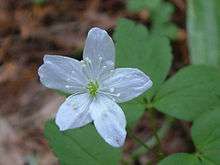Anemonoides quinquefolia
Anemonoides quinquefolia is a spring-flowering plant in the buttercup family, native to North America.[1][2] It is commonly called wood anemone, like Anemonoides nemorosa, a closely related European species. It has previously been treated as a subspecies of Anemone nemorosa.[3]
| Anemonoides quinquefolia | |
|---|---|
 | |
| Scientific classification | |
| Kingdom: | Plantae |
| Clade: | Tracheophytes |
| Clade: | Angiosperms |
| Clade: | Eudicots |
| Order: | Ranunculales |
| Family: | Ranunculaceae |
| Genus: | Anemonoides |
| Species: | A. quinquefolia |
| Binomial name | |
| Anemonoides quinquefolia (L.) Holub | |
| Synonyms | |
|
List
| |
Description
.jpg)
It is a perennial herbaceous plant, growing in early spring to 5–30 cm (2–12 in) tall,[4] and dying back down to the root-like rhizomes by mid summer. The rhizomes spread just below the soil surface and grow quickly, contributing to its rapid spread in woodland conditions, where it can carpet large areas. The flower has five (occasionally four, or six to nine) petal-like segments (actually sepals)[5] that are 6–25 mm (0.24–0.98 in) long and 4–8 mm (0.16–0.31 in) wide.[4] The flowers are usually white, but sometimes pink, or with a pink base and white tip, or with a white base and a pink or blue tip.[4][1]
The leaves are in three parts with deeply lobed lateral leaflets, giving the appearance of five leaflets. The leaf veins are branched and not parallel.
Taxonomy
It was first formally named as Anemone quinquefolia in 1753 by Carl Linnaeus in Species Plantarum. He described it as having leaves with five oval serrated parts;[6] hence the species epithet quinquefolia, meaning "five-leaved".
It is part of a species complex that includes A. grayi, A. lancifolia, A. oregana, and A. piperi.[4]
Varieties
The Flora of North America and The Plant List accept two varieties:[4][2]
- A. quinquefolia var. quinquefolia – grows over the entire species range
- A. quinquefolia var. minima – grows only in North Carolina, Tennessee, and Virginia
The two are distinguished mainly by the size of the achene (the fruit), the body of which is 2.5–3 mm (0.10–0.12 in) in A. q. var. minima as compared to 3–4.5 mm (0.12–0.18 in) in A. q. var. quinquefolia.
Other sources accept further varieties, such as A. q. var. bifolia.[7] Kew's Plants of the World Online lists no accepted infraspecific taxa for Anemonoides quinquefolia.[3]
References
- Connecticut Plants, Connecticut Botanical Society
- "Anemone quinquefolia". World Checklist of Selected Plant Families (WCSP). Royal Botanic Gardens, Kew. Retrieved 2014-05-28 – via The Plant List.
- "Anemonoides quinquefolia (L.) Holub". Plants of the World Online. Royal Botanic Gardens, Kew. Retrieved 9 August 2020.
- Dutton, Bryan E.; Keener, Carl S.; Ford, Bruce A. (1997). "Anemone quinquefolia". In Flora of North America Editorial Committee (ed.). Flora of North America North of Mexico (FNA). 3. New York and Oxford. Retrieved 2014-05-28 – via eFloras.org, Missouri Botanical Garden, St. Louis, MO & Harvard University Herbaria, Cambridge, MA.
- Chayka, Katy; Dziuk, Peter (2016). "Anemone quinquefolia (Wood Anemone) Minnesota Wildflowers". Minnesota Wildflowers.
- Linnaeus, Carolus (1753). Species Plantarum. 1. p. 541.
foliis quinatis ovalibus serratis
- "Anemone quinquefolia". Natural Resources Conservation Service PLANTS Database. USDA.